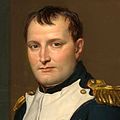Wikipedia:Selected anniversaries/March 20
This is a list of selected March 20 anniversaries that appear in the "On this day" section of the Main Page. To suggest a new item, in most cases, you can be bold and edit this page. Please read the selected anniversaries guidelines before making your edit. However, if your addition might be controversial or on a day that is or will soon be on the Main Page, please post your suggestion on the talk page instead.
Please note that the events listed on the Main Page are chosen based more on relative article quality and to maintain a mix of topics, not based solely on how important or significant their subjects are. Only four to five events are posted at a time and thus not everything that is "most important and significant" can be listed. In addition, an event is generally not posted this year if it is also the subject of the scheduled featured article or picture of the day.
To report an error when this appears on the Main Page, see Main Page errors. Please remember that this list defers to the supporting articles, so it is best to achieve consensus and make any necessary changes there first.
Images
Use only ONE image at a time
-
Harriet Beecher Stowe
-
Harriet Beecher Stowe
-
Napoleon Bonaparte
-
An illustration from an 1880s edition of the novel Uncle Tom's Cabin
-
border=yes
-
Cyclone Larry
-
Bust of Maximinus Thrax
Ineligible
| Blurb | Reason |
|---|---|
| March equinox (21:58 UTC, 2019) | twelve citation-needed tags |
| ; Independence Day in Tunisia (1956) | refimprove section |
| 235 – Maximinus Thrax acceded to the throne of the Roman Empire as a so-called barracks emperor, who gained power by virtue of his command of the army. | Date not in article |
| 1600 – Five advisers to Polish–Swedish king Sigismund III Vasa were publicly executed, effectively ending his reign in Sweden. | unreferenced section |
| 1602 – The Dutch East India Company—the first company to issue stock, one of the first multinational corporations, and possibly the first megacorporation—was established. | multiple issues |
| 1815 – After escaping from exile in Elba, Napoleon entered Paris, beginning the period known as the Hundred Days. | Tagged for lack of citations |
| 1848 – Due to the European Revolutions, King Ludwig I of Bavaria abdicated in favour of his son, Maximilian. | refimprove |
| 1854 – The Republican Party was founded in Ripon, Wisconsin, by politicians opposing the Kansas–Nebraska Act and the expansion of slavery in the United States. | Neutrality disputed banner |
| 1883 – Eleven countries signed the Paris Convention for the Protection of Industrial Property, one of the first intellectual-property treaties. | Too much uncited |
| Number landing not cited | |
| 1995 – The Aum Shinrikyo sect carried out a poison gas attack on the Tokyo subway, killing 12 people and injuring thousands of others with sarin. | refimprove |
| 2003 – A U.S.-led coalition force invaded Iraq, beginning the Iraq War. | globalize |
| 2006 – Cyclone Larry made landfall in Far North Queensland, eventually causing nearly AU$1 billion in total damage and destroying over 80 percent of Australia's banana crop. | refimprove section |
| Ai Ogawa |d|2010 | refimprove section |
Eligible
- 1760 – A fire of unknown cause broke out in Boston, Massachusetts, destroying 349 buildings.
- 1852 – Harriet Beecher Stowe's novel Uncle Tom's Cabin, which had a profound effect on attitudes toward African Americans and slavery in the United States, was published.
- 1923 – The Arts Club of Chicago hosted the opening of Pablo Picasso's first solo United States showing, entitled Original Drawings by Pablo Picasso.
- 1939 – Germany issued an ultimatum to Lithuania, demanding the return of the Klaipėda Region under threat of invasion.
- 1942 – World War II: After being forced to flee the Philippines for Australia, US Army general Douglas MacArthur (pictured) announced: "I came through and I shall return."
- 1993 – The Troubles: Two children were killed by the second of two bomb attacks by the Provisional Irish Republican Army in Warrington, England.
- Born/died: | Wareru |b|1253| Maurice Csák |d|1336| Muhammad bin Tughluq |d|1351| Alexios III of Trebizond |d|1390| Isaac Newton |d|1726/27| Adrienne Lecouvreur |d|1730|Benjamin Truman |d|1780| James Tod |b|1782| Paul von Lettow-Vorbeck |b|1870| Amanda Clement |b|1888| Abraham Beame |b|1906| Elisabeth Geleerd |b|1909| Mihajlo Petrović |d|1913| S. Arasaratnam |b|1930 Dorothy Campbell |d|1945| Amir Hamzah |d|1946| Zillur Rahman |d|2013| Eva Burrows |d|2015
Notes
- Napoleon's escape from Elba appears on February 26 so Hundred Days should not appear in the same year
- 1724 – Following the death of Pope Innocent XIII, a papal conclave convened in Rome to elect a new pope.
- 1861 – An earthquake occurred in the Argentine province of Mendoza, causing at least 6,000 deaths and destroying most of the buildings in the province's capital city.
- 1922 – The United States Navy commissioned its first aircraft carrier, USS Langley.
- 1944 – World War II: U.S. Marines made a landing on Emirau Island in the Bismarck Archipelago to develop an airbase as part of Operation Cartwheel.
- 1987 – The antiretroviral drug zidovudine (chemical structure pictured) became the first treatment approved by the U.S. Food and Drug Administration for HIV/AIDS.
- 2014 – Taliban militants killed nine civilians in a mass shooting at the Kabul Serena Hotel in Afghanistan.
- Maud Menten (b. 1879)
- Willie Brown (b. 1934)
- Fernando Torres (b. 1984)
- Christel Boom (d. 2004)








